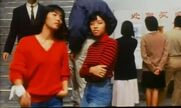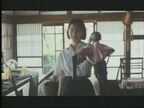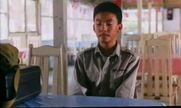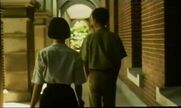"Guling Street Juvenile Murder" originates from a real case. In the early 1960s, a boy in the second year of the night school of a middle school in Taipei killed the girl on Guling Street because of his girlfriend's empathy, which shocked the society at that time. And this movie also has the shadow of Master Yang Dechang's own situation. Yang Dechang was born in Shanghai. In 1949, he moved to Taiwan with his parents when he was more than one year old. In 1959, he was admitted to the night club of Jianzhong. It can be seen that his experience is very similar to that of Xiao Si in the film, and the real juvenile murder case at that time was natural. It also left a deep impression on Yang Dechang. Real social events plus the director's personal experience, and of course the director's superb skills, make "Guling Street Teenage Murder Incident" so lifelike that the viewer feels like he is there.
Yang Dechang said: ""Guling Street Juvenile Murder" is not a simple murder case. What contributed to the murder was the entire environment, the murderer was the entire environment, and even Xiao Ming himself was the murderer." The environment, including historical background, social atmosphere, character mentality, interpersonal relationships, etc., are all deeply portrayed, from which we can clearly see how a simple and upright teenager was forced by the environment into a murderer. ,
Historical Background
"In the 38 years of the Republic of China, millions of Chinese moved to Taiwan with the Nationalist government. The vast majority of these people were only for a stable job and a stable growth environment for the next generation. However, in the In the process of growing up this next generation, they find that their parents are living in a state of uncertainty and fear about their future. In this extremely uneasy atmosphere, these teenagers often organize gangs to strengthen their young and weak will to survive."
This is a subtitle at the beginning of the film, which is of great significance for understanding the film. The turbulent situation in Taiwan in the early 1960s is reflected in several radio broadcasts in the film. Compared with the people in the province, the immigrants from the mainland are even more worried. Many details in the film describe the scars caused by history: Xiao Si's mother left her documents in a hurry before moving to Taiwan, so she has been in Taiwan for more than ten years without job security; Teacher Xia did not know when she arrived in Taiwan. As a matter of time, he returned to the mainland to pick up relatives, but he never returned to Taiwan. Since then, he has been separated from his mother Xia; Xiao Ming and his mother fled to Taiwan with his uncle's army, only to find that life in Taiwan is not as stable and beautiful as his uncle promised, but endured for a long time. The hardships of being displaced; as for the political persecution of Xiao Si's father due to historical issues, it is the highlight of the film; and so on.
In the turmoil, in addition to fear, the immigrants also remembered their time on the mainland. Xiao Si’s mother often recalls her colorful and carefree life in Shanghai when she was a girl with a sweet face; the old man who sees a doctor in the school hospital will also chatter to the nurse about how the German’s drain pipe in Qingdao is. It is spacious, unlike Taipei, where water accumulates when it rains. These nostalgic emotions are precisely due to the disappointment of reality in wandering and helpless.
The mentality of the parents will naturally affect the growth of the next generation. The formation of the family environment and social environment in the film is inseparable from this specific historical background.
The family
Yang Dechang has never had too good fantasies about human nature. Xiao Si's family life is not as elegant and gentle as depicted in ordinary film and television works. The eldest sister always supports the younger sisters in a rough voice; the fourth rudely refuses the persuasion of the second sister; the mother does not understand the religious beliefs of the second sister; the father and mother are always quarreling... The character that impressed me the most was the little sister, who did not understand the second sister's religious beliefs. Children don't have the innocence and kindness that ordinary people think children should have. Instead, they show the evil side of children. They are selfish and unreasonable. She would take away the notebook that her father had placed under the radio without saying hello, causing the radio to malfunction, and then arguing afterward. She also likes to make small reports and sue her brothers and sisters in front of her parents. There is also a scene in the film where Xiaomei arrogantly competes with Xiaosi for the toilet. Although it is a small detail, it can be seen that the director's ingenuity in shaping the characters is obvious.
However, although the way family members express their feelings is rough, the family relationship itself is not weak, and in times of crisis, family members can always get support. Fierce Baba's eldest sister is actually a person with a strong sense of family responsibility. The second child stole his mother's watch to gamble. After the eldest sister scolded, she still took out her own money to redeem the watch for the second child. The eldest sister also considered giving up the opportunity to study abroad, taking into account the heavy burden at home. There is also a scene where the second child is beaten for the fourth child, which is also very touching.
The more exciting part is that after the father's dismissal, the couple quarreled in the mosquito net. The mother mocked the father who was betrayed by the dog and didn't know it, which angered the father. The father shouted: "You women, you don't understand the friendship between men at all!" In fact, his father didn't know about Wang Gou's behavior, but his mother's scolding made him very embarrassed. When he defended Wang Gou in front of his mother, he was actually defending self-esteem as a man. Afterwards, the scolded mother came to the courtyard to cry, and the father followed and said, "I only have you and a few children left, don't scare me." The mother replied, "As long as you are not afraid, I will do anything. Don't be afraid." Then the couple hugged each other and cried. The love of husband and wife in the same boat is evident.
This kind of family life is very different from what is seen in ordinary film and television works, and it may feel awkward at first glance. But if you think about it, isn't that what life is all about? In our daily life, how can the way family members communicate with each other, how can they be respectful and graceful all day long? But words and deeds may occasionally be rude, but the affection for each other is unswerving.
Compared with the growth experiences of other teenagers in the film, Xiao Si's family environment is obviously much more sunny, and the development of Xiao Si's simple and upright character is undoubtedly deeply influenced by his parents and siblings.
The image of the teacher
in "Guling Street Teenage Murder Incident", as satirized in The Wall, is completely irreverent and lovely. Obviously, Yang Dechang didn't have a good impression of middle school teachers in his youth. The teachers in the film are arrogant, arrogant, rude, and foolish. In addition to making people angry, they are also very funny.
A typical scene in the film is a teacher who speaks Shandong dialect. First, he takes "mountain" as an example and brags about the simplicity of Chinese characters. After being questioned by Xiaomao, he was ashamed and angrily punished Xiaomao for writing the word "I", and then made Xiaosi stand for no reason. It was a complete comedy. What makes me sigh is that decades later, such a situation will still not be unfamiliar to us. I believe that many people of the same age have such teachers in their childhood experiences.
As Xiao Si's father said, such a school is really "duck and duck", and "good students will be taught badly." Even a decent student like Xiao Si would be forced to contradict the teacher, and it is reasonable for the group of gangsters in the night department to oppose the teacher.
The corruption of teachers' morality is also closely related to the historical background. Yang Dechang especially emphasized the strong dialects of the teachers, which shows that the teachers are also part of the immigrant army. Like the other parents of Xiao Si, the teachers also suffered the pain of history and were equally dazed and fearful about the future.
Xiao Si recorded a major demerit once, and was expelled from school once. It was not his fault. It is a stupid teacher who arbitrarily changes a student's future. Whether directly or indirectly, the final tragedy of Primary Four has the school's responsibility. Teachers are both victims and perpetrators.
Dependents' Village Classmates
At the beginning, the Kuomintang built a piece of simple residence in order to accommodate a large number of soldiers and their families who moved to Taiwan. This is the famous military dependents' village in Taiwan's history. The living conditions in military villages are extremely harsh, equivalent to slums. Compared with intellectual families like Xiao Si, the environment for teenagers in military dependents’ villages to grow up is particularly harsh. Gang culture is prevalent in military dependents villages, and teenagers often form gangs to seek a sense of identity. "Guling Street Teenage Murder Case" has a vivid expression of the culture of military dependents' villages. For example, there are all kinds of characters in the rabble crowd called "Little Park".
I think Elvis is one of the most brilliantly portrayed characters in the whole film, full of personality. This little man has a good sense of music and is named after his good imitation of Elvis. Because it often needs Xiao Si's eldest sister to help translate the English lyrics and is familiar with Xiao Si, he is one of the reasons why Xiao Si is involved in the dispute in the small park. The cuteness of Elvis is that he is essentially an innocent and simple person, but he is a big kid, and he has to pretend to be sophisticated and sophisticated, which has made a lot of jokes. Elvis has a chivalrous heart, and although he often messes things up, he is always ready to stab his friends. His friendship with Xiao Si is sincere and pure. The tape he gave Xiao Si at the end of the film is particularly moving.
The slick is a straw bag that is strong on the outside and dry in the middle. After being expelled from school, he first betrayed his buddies, and then became self-absorbed after a bloody conflict. The slick change made Xiao Si believe that people can be changed. After this belief repeatedly hit a wall in reality, Xiao Si paid a painful price.
The pony has a special status and does not belong to the slums of the military dependents' village. He is the son-in-law of the garrison commander, heroic and righteous. Pony regards women as playthings, and some of his words and actions may be criticized morally, but Pony is by no means a dirty person. Although his friendship with Xiao Si is different from that of Elvis, it is equally sincere. After Xiao Si was arrested for murder, Xiao Ma cried bitterly: "I only have him as a good friend." The weight of this sentence is self-evident.
Xiao Si does not belong to the people in the arena, and has always been outside the gang. At first, he just watched the various activities of the small park, and it was not until he got to know Xiao Ming that he gradually got involved in the right and wrong of the small park.
Xiao Ming also lives in a military dependents' village, and her life under the fence of others has made her experience the harshness of the world early, which is in contrast to Xiao Si's relatively stable and pure living environment. The boys in the military dependents’ village formed gangs to strengthen themselves, and the girls, such as Xiao Ming, kept changing accounts in order to gain a sense of security in the turbulent life. Xiaoming, who looks pure and innocent, has the sobriety and sophistication of a mature woman in his bones. Her outlook on life is out of tune with that of Xiao Si, and the conflict between the two has led to tragedy, which is actually reasonable.
ideal brilliance
Yang Dechang is rational. His shots always have a sense of depth, keeping a certain distance from the characters in the play, appearing calm and prudent. However, under the sharp and cold appearance, there are warm feelings of compassion and compassion, so in the bleak environment of the film, there are still a few special characters, shining with the brilliance of idealism, giving Xiao Si confidence and strength. However, it can also be said that it is these ideals that make Xiao Si run into walls everywhere in society and finally go to destruction.
Xiao Si didn't communicate much with his mother and siblings at home, only his father could talk for a long time. My father was a traditional scholar, decent but not cowardly, and dared to speak bluntly about the ugliness of the world. Xiao Si's way of life is most influenced by his father, who is his benchmark. Because of this, Xiao Si is the least able to accept his father's compromise with reality.
The third and second sisters are Christians, devout, persevering, tireless in teaching, and always tolerant of injustices. Although Xiao Si usually disapproves of the second sister, she has deep respect and love in her bones.
Honey, the spiritual leader of Little Park, looks like the most otherworldly person in the entire film, shrouded in mystery all over his body. In the little ice shop, Honey's appearance was so majestic. In the neat composition, Honey is always on the central axis, making his back look very intimidating. In Xiao Ming's words: "Everyone is afraid of him, but in fact he is the most honest." The so-called "honest" means upright. The melancholy character coupled with the influence of "War and Peace" makes Honey particularly advocating lonely heroes. Honey's charisma makes Xiao Si fascinated. Honey's death inspired Xiao Si's confidence and strength to protect Xiao Ming.
These fighters who guarded their ideals ended up unfortunate in the end. His father became cowardly and compromised after a political change; Honey single-handedly challenged 217, but was killed by a conspiracy; after Xiao Si was arrested, the always forbidding second sister cried out in despair.
Four's turning point
Honey's death did not break the fourth, and the dismissal of her father did not break the fourth, and even being expelled from school only inspired the fighting spirit of the fourth. Idealists are not afraid of frequent setbacks, they are afraid of their spiritual support being destroyed. What really hurt Xiao Si was the change in his father's character. From the outdated reasoning to the complacency when he was fired, the father's lofty image in Xiao Si's mind collapsed. The whole film "Guling Street Teenage Murder" is based on a simple and realistic style, and such a deliberate contrast between before and after is particularly eye-catching.
After his father surrendered to reality, Xiao Si was sad and still did not give up his principle. He tried hard to prove something by taking action, and Xiao Ming was his target of action. Xiao Si has always been fighting against all kinds of injustices in the world, and it can be said that he is getting stronger and stronger. In his wishful thinking, he cited Xiao Ming as the person closest to him. He couldn't tolerate Xiao Ming's frequent changes of accounts and was looked down upon by others, and he wanted to change Xiao Ming with confidence. Unexpectedly, Xiao Ming's disapproval remarks were exactly the same as Xiao Cui's, and Xiao Si's full of hope was ruthlessly dispelled. It turned out that Xiao Ming was not what he imagined, and now Xiao Si completely collapsed. Originally brought a knife to block the pony, but in desperation, he stabbed Xiao Ming. Youth is such a dark ending.
"Guling Street Teenage Murder" seems to be a common campus theme, but its focus is by no means limited to the youthful life of teenagers. The film cares about the entire Taipei society in a specific era.
View more about A Brighter Summer Day reviews











